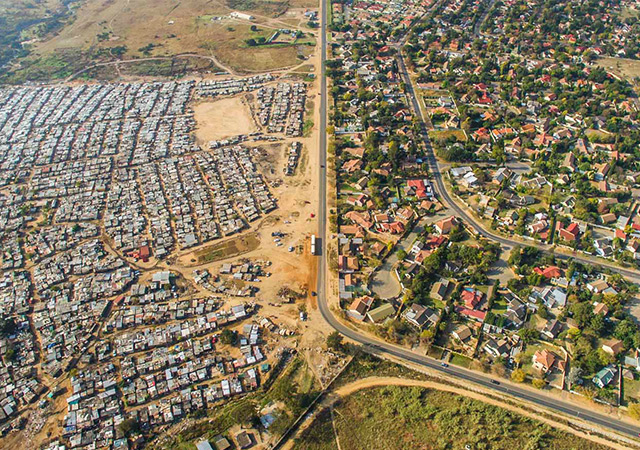By Tucker Brown
I was recently asked by Loyola’s Pastoral Counseling department to serve as a panel discussant following a talk given by Dr. Ken Pargament, one of the pioneers in the psychology of religion and spirituality. The faculty wanted me to share some reflections on the application of pastoral counseling principles in urban, underserved communities. As I sat with the topic I’d been given to consider, I thought about the way in which people sometimes talk about poverty as a “social problem” and the accompanying assumption that it’s remediable through hard work, education, and programming intended to advance disadvantaged communities. All of which presupposes, it seems to me, that poverty is either a personal failure or a breakdown in the system and that we only need to strengthen the person or tweak the system to overcome it. But what if the system is doing what it’s supposed to? Poverty, then, would really be a form of structural deprivation. A kind of forced starvation (i.e., material, emotional, intellectual, relational) in which so-called underserved communities suffer by necessity while others horde, inherit, and secure — even violently — the world’s resources. This was my line of thinking when I prepared and offered the following remarks:

I live, work, and play at Jonah House: An intentional peacemaking community founded by Phil Berrigan and Liz McAlister and a few others, who, motivated by faith, believed that it was their moral responsibility to resist every incarnation of violence and oppression. Their resistance often meant risking arrest, putting their lives and their bodies on the line for the sake of bearing witness to equality and justice, love and the way of nonviolence.
As I reflect on the question we’ve been asked to consider — particularly in terms of Dr. Pargament’s point about exploring new domains for therapeutic interventions outside traditional clinical contexts — I do so from this rather radical — and by radical I mean root, or original — tradition of peacemaking.
In discussing underserved communities, I think it’s important to begin by examining how we understand economic and social disparities. I would like to suggest that the pervasiveness of poverty, in all its forms, is not a failure of our systems, but a reflection of their proper functioning. In other words, underserved communities are a necessary consequence of social systems intended to advance, preserve and secure access to wealth and well-being based on certain identities like race, in particular whiteness, as well as educational background, social class and capital, profession, geography, gender, sexuality, and language. To name only a few.

As spiritually-integrated helping professionals, I believe we uniquely experience a moral imperative to resist these and other injustices and to accept the risks of doing so. But what are we willing to risk to transform the systems and institutions that perpetuate and preserve structural disparities? And if we believe that, as a principle of pastoral counseling and as Dr. Pargament pointed out, the therapeutic relationship initiates a spiritual dimension, what would it mean for us to hold and participate in this sacred space, especially in our work with underserved communities and clients, outside the clinical context?
My decision to join Jonah House grew out of my personal and professional struggle to address these questions. As I worked with clients from underserved communities, first in Baltimore and then in New Mexico and Oregon, I was confronted with the matter of my moral responsibility to help change the injustices that necesitated their poverty, whether material, emotional, or educational. I came to the conclusion that an individual therapeutic relationship, for me, wasn’t sufficient. That I was called to another way.

At Jonah House we care for a once-neglected 22 acre cemetery, 8 acres of which is a forest patch that offers beautiful greenspace in an otherwise treeless neighborhood withering from violence, addiction, and other symptoms of structural inequality. We run a food pantry, host student groups, and organize social justice actions in the city and elsewhere. In all that we do, though we fall short of the mark, we try to co-create a healing presence and kindle the spiritual dimension that’s the heart, body and wisdom of therapeutic encounter.
I’m not suggesting that the life I lead is an exemplar everyone should follow to realize transformative social change. And I will add that I’m still, and always will be, considerably more privileged than my neighbors in West Baltimore — in spite of my good intentions to live in solidarity with them. The risks I take are choices and theirs are not.
But I do believe, to paraphrase the Jesuit Dean Brackley, that by resisting a world obsessed with wealth, security, upward mobility and prestige, I’m able to see more clearly how that world — its values and the disparities these values necessitate — engenders and preserves underserved communities and the kinds of struggles they suffer with daily.

This clarity invites me to live differently. And it’s a constant challenge, particularly to my privilege and the ways I benefit from systems intended to reinforce whiteness, maleness, and formal education. The challenge comes to me as a question, like a koan, whenever I interact with others in my community: What might I risk so that you don’t have to live at risk every moment of your life?
I leave you with that question to consider.


